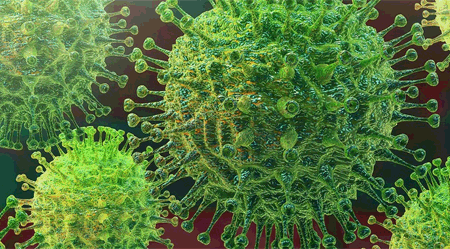Welcome to the Coronavirus Zone
The current planetary health crisis is the greatest disruption of our lifetime, and the first crisis to take place in a world where the vast majority of people are online. Center director Jeffrey Cole analyzes the situation and announces a bold new research initiative.
By Jeffrey Cole
It feels like we’ve been sucked into an episode of The Twilight Zone: we can call it The Coronavirus Zone.
 With little warning and – more importantly – even less preparation, we find ourselves confined to our homes with just what we have in our kitchens or what we could get from local stores before the shelves (and toilet roll holders) were laid bare.
With little warning and – more importantly – even less preparation, we find ourselves confined to our homes with just what we have in our kitchens or what we could get from local stores before the shelves (and toilet roll holders) were laid bare.
Most of our jobs, if we still have them, are now online. We are living our lives in the world of Zoom. In-person classes at all schools are cancelled, probably for the rest of the school year, as instruction moves online – for those schools that are prepared for it. And the teachers running these online classes have mostly never taught this way and need to get up to speed – quickly.
Some people who previously resisted using ATMs now, out of safety concerns, have moved to online banking and online bill pay.
We are learning – not by choice, but by necessity – how to live on the internet 24/7.
The lucky ones – those of us who already have experience working and transacting online with dedicated workspace in well-connected homes with plenty of bandwidth – may be more productive than ever. Others, whose jobs do not translate to digital or who lack basic hardware with fast enough connections, are at a major disadvantage; those folks now worry about how their lives will be permanently changed whenever this is all over.
No matter whether we are flourishing or stuck in neutral, we all miss the ability to be around our friends and even strangers in parks and restaurants. Even people who hate their jobs probably miss going to the office.
This crisis will test relationships. Even with abundant connected technology, those living alone may experience profound isolation or loneliness, while those living with their families may experience different kinds of stress. Sheltering in place will probably put a magnifier on our relationships: good ones may become even closer and better, while bad ones may deteriorate.
Social scientists will be closely monitoring birth and divorce rates over the next year.
We are being thrown into a cosmic experiment. The only thing missing is the kicking and screaming.
This is the greatest disruption of our lifetime
Nothing else even comes close. During 9/11 and the days after, flights were cancelled and many did not want to get on an airplane or go to large gatherings (conferences, Disneyland) for a few months. But after a few days, everything else quickly re-opened for business.
___________________________________________________________________________
The Center is preparing to go into the field over the next ten days to learn about how people are doing in isolation, working and learning and buying online, not being able to interact face-to-face with our friends and non-immediate family. We want to know what people miss the most. What are some of the benefits of the new world we are living in? What changes do Americans believe at this point might be permanent?
___________________________________________________________________________
During the Second World War, there were shortages and rationing, loved ones were separated from us, but everyday life went on. The closest we may come to the current situation was during the “Spanish” flu epidemic of 1918 (which killed my own grandfather long before I was born). Careful study of that pandemic will offer many valuable lessons in how changes in daily habits can eventually end a deadly pandemic.
Beyond the closure of schools and offices, events large and small have been delayed or outright cancelled. Baseball’s opening day has been indefinitely delayed; all NBA games are quiet. The Olympics have been delayed for a year, and who knows if they will even happen in 2021.
Mother’s Day and Graduations, if they happen at all, may become online celebrations. Movie theaters, already in danger before the Coronavirus, are suffering another major setback. Production across Hollywood studios has halted, so soon there will be few new movies and TV shows anywhere, let alone in the theaters.
Home delivery for food and other products by Amazon and others will thrive so long as supply chains are working and the supermarkets can continue to get enough people willing and able to show up for work at the markets and others to drive.
One of the Center’s brightest Senior Fellows, Kumar Mehta, has written that the Sharing Economy is morphing into the Isolation Economy. Most of the things we did by leaving our homes (shopping, working, formal learning) are now being done online.
Although none of us volunteered or gave permission, we are in the midst of the greatest social science experiment in history. The 2020 Coronavirus Crisis (let’s hope it is restricted to this year) will fuel articles and books for generations.
Whether we make permanent changes in our work and personal lives or quickly revert to the old ways will determine which businesses thrive and which never reappear.
For several years, Netflix, Hulu, Amazon Prime and others have trained us to expect first-run quality entertainment on our big screens at home through streaming. Will movie theaters ever return as an important part of our lives post Coronavirus? The fates of movie theaters and thousands of other disrupted businesses (restaurants, malls, concerts, sports) rest on the answers to these questions.
A new study by the Center
In the current crisis, we are seeing profound change day by day. In two months, the role of digital in our lives may find a completely new place. Unlike our 20-year tracking project, the World Internet Project (WIP), which uncovers incremental change year to year, in this crisis, lifelong habits are changing in a matter of days.
Immediately after 9/11, we broke with our usual schedule and went into the field to survey Americans in order to learn how people got information about the terrorist attack and how they communicated with family and friends. The publicly available internet was new in 2001, and many were still just learning the ropes.
Today, in 2020, we’re in a similar situation.
We believe that everything is changing, and so the Center is preparing to go into the field over the next ten days to learn about how people are doing in isolation, working and learning and buying online, not being able to interact face-to-face with our friends and non-immediate family.
We want to know what people miss the most. What are some of the benefits of the new world we are living in? What changes do Americans believe at this point might be permanent?
Unlike in 2001, we expect to go into the field multiple times to track how American experiences and attitudes change month over month.
Stay tuned. We’ll share results here in these columns, in data published elsewhere on our website, and in video briefings.
____________

Jeffrey Cole is the founder and director of The Center for the Digital Future at USC Annenberg.
See all columns from the center.
April 1, 2020

